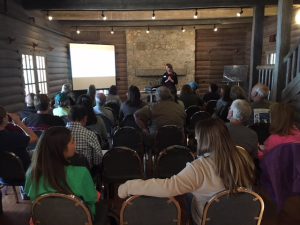
On a beautiful October day, 35 people gathered at the Camp Helen State Park lodge to share information about the rare Coastal Dune Lakes (CDLs) that line the coast of Walton and Bay Counties. Organized by the University of Florida Extension Programs in Bay and Walton counties, the Water School included a morning seminar series featuring speakers from various groups that work together to support the lakes. Laura Tiu, Sea Grant Agent for Walton and Okaloosa counties started off the day giving a broad overview of the history and ecology of the lakes. Brandy Foley of the Choctawhatchee Basin Alliance shared her research on the paleolimnology, or study of the lake sediments over time, of two coastal dune lakes. Clayton Iron Wolf, a ranger at Camp Helen, gave a summary of the importance of Lake Powell and its benefit to the park. Jeff Talbert of the Atlanta Botanical Garden thrilled attendees with his pictures and research on the Deer Lake State Park restoration project. Norm Capra, who wears many hats, including that of the Lake Powell Community Alliance and Friends of Camp Helen State Park, shared the work they have done promoting conservation of shorebirds there. Dr. Dana Stephens, Director of the Mattie Kelly Environmental Institute at Northwest Florida State College shared analyses of many years of water chemistry and quality data collected on the lakes. Melinda Gates, Environmental Specialist for Walton County, wrapped up with a presentation on the efforts to protect and preserve the lakes.
The attendees seemed pleased with the event with one hundred percent of attendees rating the quality of information presented, usefulness of information, speakers’ knowledge, overall value of the program, and quality of location as good or excellent. The seminar helped attendees identify important roles of the CDLs in the ecosystem and understand why it is important to protect them. Several participants plan to make behavior changes based in the workshop including: joining or volunteering with Choctawhatchee Basin Alliance, Audubon, Sierra Club or Lake Watch Volunteers; sharing the information; living minimally; and engaging in activism. The seminar was followed by a kayak tour lead by Scott Jackson, Bay County Sea Grant Agent, to the outflow of Lake Powell and a visit to a faux sea turtle nest demonstration by Florida Fish and Wildlife Commission. This Water School was part of a regional series offered by UF/IFAS Extension. For more information on future schools, please subscribe to our Panhandle Outdoors Newsletter.
 0
0
